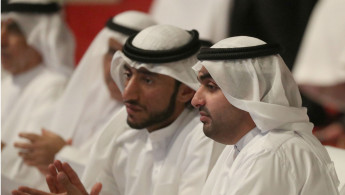UAE prince exposes rifts and seeks asylum in rival Qatar
Sheikh Rashid Bin Hamad Al Sharqi, the son of the Emir of Fujairah, one of the seven emirates that make up the UAE, received asylum via the Embassy of Qatar in London.
Sharqi was allegedly flown to Qatar by private jet using his Emirati passport on May 23 after having arrived at the embassy on May 19.
The incident only threatens to deepen the existing Gulf crisis between the two states.
Sharqi served as chairman of the Fujairah Culture and Media Authority and was expecting to be appointed crown prince of the eastern emirate, however an internal rift between Sharqi and Bin Zayed erupted when Sharqi’s younger brother was proposed as the crown prince instead.
In a damning interview with The New York Times, Sharqi accused the UAE rulers of blackmail and money laundry, although did not provide any evidence to support his statements. He also spoke openly about UAE tensions that were only previously alluded to, in particular, resentment over Abu Dhabi’s leadership of the UAE’s military intervention in Yemen.
Qatar reportedly offered Al Sharqi some $6.7 million in cash, a safe haven in a palace in Doha and a diplomatic role in mediating the Gulf crisis after knowing that the Emirati had been staying in London’s 45 Park Lane Hotel for over a month.
Saudi Arabia, the UAE, Bahrain and Egypt severed ties with Qatar last June over accusations of supporting extremism and being too close to rival Iran - charges Doha has denied.
The four countries enforced a blockade on Doha, closing land, sea, and air links to the country. Gulf states also ordered Qataris to leave within 14 days as well as calling home their own citizens.
Saudi Arabia has also threatened to dig a canal across its border with Qatar, effectively making the Gulf peninsula state an island, sparking outrage in Doha.
Qatar says the Saudi-led bloc are seeking regime change in Doha, while the spat has remained in a stalemate. Doha is appealing to the International Court of Justice (ICJ) in The Hague to order emergency measures to lift the restrictions imposed on Qataris by the UAE in June 2017.
The UAE and Saudi Arabia in turn announced that they will file a separate complaint at the ICJ, accusing Qatar of violating their airspace.
The four nations have demanded Doha accepts a list of 13 conditions, including shutting Al Jazeera and The New Arab, to open a dialogue to resolve the conflict.
Mediation efforts, mainly led by the emir of fellow Gulf state Kuwait, have so far failed to break the deadlock.
While the crisis has shaken the politics of the region, it has also had serious impact on the lives of ordinary civilians on the ground.
A report published earlier found that families had been separated and imports - including medicine - obstructed, among other obstacles.
In January, the UN's human rights office accused the four countries of orchestrating a hate campaign against Qatar, which included threats to kill the country's emir.





 Follow the Middle East's top stories in English at The New Arab on Google News
Follow the Middle East's top stories in English at The New Arab on Google News
![Israeli forces ordered bombed Gaza's Jabalia, ordering residents to leave [Getty]](/sites/default/files/styles/image_330x185/public/2176418030.jpeg?h=a5f2f23a&itok=_YGZaP1z)

